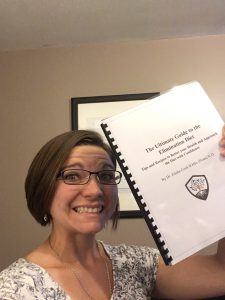 At the beginning of this year I had set out to complete my book, and I am happy to say that I have accomplished that goal! My book is titled:
At the beginning of this year I had set out to complete my book, and I am happy to say that I have accomplished that goal! My book is titled:
“The Ultimate Guide to the Elimination Diet: Tips and Recipes to Better Your Health and Approach the Diet with Confidence”.
Many of my patients have heard about the elimination diet, but not everyone is familiar with it, and so, let me shed some light on it. The elimination diet is a treatment option that helps individuals that are suffering from many different health concerns including
- Pain
- Anxiety
- Inability to lose weight
- Fatigue
- Stress
- Arthritis
- Muscle Pain
- IBS (Irritable Bowel Syndrome)
- Constipation/Diarrhea
- Brain Fog
and the list goes on! That means if you want to lose weight, reduce pain, think clearer, and feel better overall, this diet may be right for you. The elimination diet is a way for individuals to identify which foods may be contributing to their health concerns, but also helps individuals to adopt more of a whole – foods diet.
Though this may sound simple enough, the diet is quite complex, complicated, and challenging. Many individuals struggle to follow it or incorporate it into their lifestyle even for a short time. I wrote this guide (and recipe) book as a way to help individuals overcome the hurdles of the diet. In the book, I have outlined meal plans, tips and tricks, many recipes for each meal (and sauces and dips!), and ultimately set out to help eliminate many of the struggles that individuals tend to encounter with the diet. I have based the book off of my clinical experience as well as my personal one. I was prescribed the elimination diet years prior by my ND before I became an ND and it was a struggle. I was miserable throughout it and could not figure out what I should eat. My diet was boring and basic, but I did complete it and I did learn a lot from the experience. I also learned my food sensitivities and improved my overall state of health from it. Following the experience, I set out to help others through the diet on their way to better their health. I have seen many individuals completely change their lives through this diet, and you can too!
If you have any one of the health concerns mentioned above and want to better your health, the elimination diet may be a treatment to consider. As I mention in the book, this diet is not for everyone or appropriate for everyone, and so, it is best to complete this diet with the supervision of a Naturopathic Doctor such as myself. If you are ready for change, send me an email or call our office (519-537-7058) to see if this is a good path for you to pursue. I offer complimentary 15 minute meet-and-greet sessions where you can meet me, ask your questions, and decide from there if you would like to see me or not (i.e. there is no obligation to book). You have nothing to lose by booking this session. Now is the time to take care of you.
In regards to my book, if you are interested in purchasing your copy, send me an email, call the clinic, or contact me through the Facebook page and I will gladly get you set up. In addition, I am offering the book as part of a package deal for those who may want to pursue food sensitivity testing. Both prices are outlined below.
- The Ultimate Guide to the Elimination Diet: Tips and Recipes to Better Your Health and Approach the Diet with Confidence – $20 +HST per book (Total $22.60)
- Blood Testing and Book Package (only available from August 1- August 30 2017) – get the food sensitivity testing (approximately $260 plus the book for an additional $15) (Total: Approximately $273)
If you have any questions about this treatment option, food sensitivity testing, or simply about how you can feel better today, do not hesitate to email me, message me, or contact our clinic and book your complimentary 15 minute meet-and-greet session today!
Have you benefited from reading this blog? Know someone that would benefit as well? Share, Like, Comment, or Tweet this article, and let me know what you think.
Some of the information provided above may not be appropriate for everyone, please consult with your doctor before trying any of the above. If you are interested in Naturopathic Medicine and wanting a different approach to your health care needs, contact Dr. Elisha Cook ND by calling 519-537-7058 and book your appointment today!

